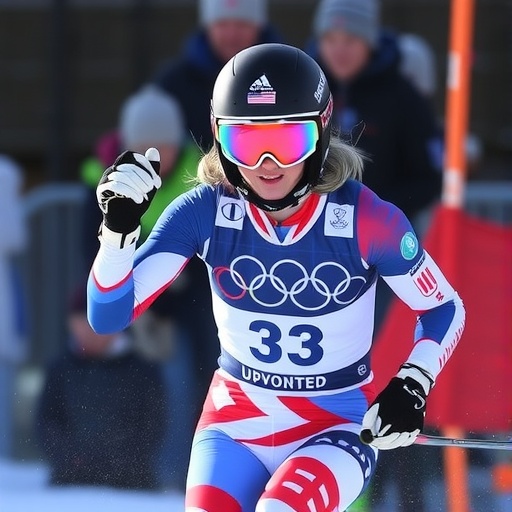Mikaela Shiffrin Powers to Fourth in World Cup Giant Slalom Opener in Soelden, Boosting U.S. Alpine Skiing Hopes
In a pulse-pounding start to the 2023-2024 FIS Alpine Ski World Cup season, American superstar Mikaela Shiffrin stormed to a fourth-place finish in the women’s giant slalom in Soelden, Austria, on October 21, 2023. The 28-year-old Olympic gold medalist, chasing her eighth overall World Cup title, clocked a combined time of 2:25.02 across two runs, trailing winner Federica Brignone of Italy by just 0.78 seconds. This strong showing not only signals Shiffrin’s return to form after a challenging offseason but also ignites optimism for the U.S. ski team’s campaign in alpine skiing’s premier circuit.
- Shiffrin’s Tactical Masterclass on Soelden’s Demanding Glacier
- U.S. Ski Team Shines Bright in Season-Opening Giant Slalom
- Brignone’s Victory and the Global Battle for Giant Slalom Supremacy
- Shiffrin’s Journey: From Offseason Hurdles to Soelden Glory
- World Cup Momentum Builds: What’s Next for Shiffrin and Alpine Skiing Elite
The Rettenbach glacier course in Soelden, a legendary venue known for its steep pitches and variable snow conditions, tested the mettle of the world’s top slalom specialists. Shiffrin, who has dominated giant slalom with 21 career World Cup victories in the discipline, started her first run conservatively but unleashed speed in the second, climbing from sixth to fourth. Her performance came amid a field of fierce competitors, including Sweden’s Sara Hector, who took silver, and Switzerland’s Lara Gut-Behrami in third.
Shiffrin’s Tactical Masterclass on Soelden’s Demanding Glacier
Mikaela Shiffrin‘s fourth-place finish in the World Cup giant slalom wasn’t just a result; it was a tactical clinic on navigating Soelden’s notoriously tricky terrain. The course, dropping over 800 vertical meters with a mix of icy patches and softer snow under sunny skies, demanded precision turns and explosive recoveries. Shiffrin, starting bib 5 in the first run, posted a time of 1:13.45, placing her sixth initially—a position that could have spelled disappointment for the six-time overall World Cup champion.
But Shiffrin thrives under pressure. In her second run, she shaved off crucial seconds, finishing in 1:11.57 to surge ahead of Italy’s Federica Brignone, who held on for the win with a total of 2:24.24. “The second run felt like I finally found my rhythm,” Shiffrin said post-race, her voice steady despite the adrenaline. “Soelden always sets the tone, and I’m glad I could fight back like that.” Her strategy focused on clean lines through the steeper sections, avoiding the pitfalls that felled several top seeds, including Austria’s home favorite Stephanie Venier, who crashed out early.
Statistically, Shiffrin’s performance highlighted her enduring prowess in alpine skiing. With this result, she now has 97 career World Cup podiums, inching closer to the all-time record held by compatriot Lindsey Vonn at 113. The giant slalom, one of alpine skiing’s blue-ribbon events requiring a blend of power and finesse, suits Shiffrin’s aggressive style perfectly. Experts noted her edge in the final sector, where she gained 0.45 seconds on Brignone, showcasing the fine margins that define World Cup racing.
Beyond the numbers, Shiffrin’s run resonated emotionally. After a summer marred by personal losses—including the passing of her father in 2020—and minor injuries, this fourth place felt like a monumental step. “It’s not the podium I wanted, but it’s progress,” she added, emphasizing mental resilience. Fans on social media erupted with support, trending #ShiffrinStrong worldwide, underscoring her role as alpine skiing’s global ambassador.
U.S. Ski Team Shines Bright in Season-Opening Giant Slalom
The U.S. ski team’s collective effort in Soelden’s World Cup giant slalom extended far beyond Shiffrin’s standout performance, painting a picture of a resurgent force in women’s alpine skiing. Teammate Bella Wright, in her breakout season, stunned with a ninth-place finish—her best World Cup result yet—while AJ Hurt rounded out the top 20 in 18th. This podium proximity for multiple Americans marked the strongest U.S. start in years, contrasting with the team’s inconsistent showings in recent openers.
Under the guidance of head coach Paul Kristofic, the U.S. squad arrived in Soelden battle-tested from summer training camps in New Zealand and Chile. “Our depth is our strength this year,” Kristofic told reporters. “Mikaela sets the bar, but seeing Bella and AJ compete at this level shows we’re building something special.” Wright’s ninth place, achieved with a bold first-run attack that placed her 12th before consolidating in the second, earned her widespread praise. The 22-year-old from Washington state credited Shiffrin’s mentorship: “Skiing with Mikaela pushes you to new limits—her work ethic is infectious.”
Historically, Soelden has been a U.S. stronghold; Shiffrin won here in 2018 and 2019, and Lindsey Vonn claimed victory in 2010. This year’s results build on that legacy, with the team scoring 100 points in the discipline standings—up from 65 last season. Factors like improved equipment tuning and a focus on injury prevention contributed to the success. The U.S. Ski & Snowboard Association reported that national team funding has risen 15% since 2022, enabling more high-altitude simulations akin to Soelden’s 2,300-meter start.
Challenges persisted, however. Weather shifts mid-morning forced course adjustments, and several U.S. hopefuls, like Hailey Duke in 32nd, struggled with visibility in the fog-shrouded upper sections. Yet, the overall vibe was triumphant, with Shiffrin and teammates celebrating in the finish area, Austrian beer in hand—a nod to the event’s festive spirit despite the competitive edge.
Brignone’s Victory and the Global Battle for Giant Slalom Supremacy
Federica Brignone’s wire-to-wire win in the Soelden World Cup giant slalom capped a flawless performance, but it also illuminated the intensifying global rivalry in women’s alpine skiing. The 33-year-old Italian, who ended a 13-year podium drought last season, led after the first run with a 1:12.79 and defended her lead masterfully in the second. Her victory, her second in giant slalom at Soelden, boosted her career tally to 18 World Cup wins and positioned her as a dark horse for the overall title.
Silver medalist Sara Hector of Sweden, finishing 0.35 seconds back, showcased Scandinavian precision with smooth carving through the course’s 62 gates. Lara Gut-Behrami, the Swiss veteran and 2021 overall champion, rounded out the podium in third, just 0.52 seconds off Brignone’s pace. “This win feels like validation after so many close calls,” Brignone shared in Italian media, her eyes gleaming. The top three represented a diverse threat: Italy’s power, Sweden’s consistency, and Switzerland’s experience.
In the broader World Cup context, Soelden’s opener sets early markers. Shiffrin’s fourth place nets her 40 points toward the giant slalom crystal globe, trailing Brignone’s 100. The discipline’s points system—100 for first, 80 for second, and so on—rewards consistency across 8-10 races. Last season, Shiffrin clinched the giant slalom title by a razor-thin 5-point margin over Gut-Behrami, proving every position counts.
Emerging talents added intrigue. Norway’s Kristine Haugen, 19, finished seventh in her World Cup debut, signaling youth infusion. Meanwhile, absences like Mikaela’s rival Petra Vlhova, sidelined by knee surgery, opened doors. Organizers reported record attendance of 12,000 spectators, with live broadcasts reaching 150 million viewers globally via Eurosport and NBC, amplifying alpine skiing’s reach.
Environmental notes surfaced too: Soelden’s glacier, shrinking due to climate change, prompted discussions on sustainable snowmaking. FIS officials committed €2 million to eco-friendly practices, ensuring venues like this endure for future World Cup stars.
Shiffrin’s Journey: From Offseason Hurdles to Soelden Glory
Mikaela Shiffrin’s path to fourth in Soelden’s giant slalom was forged in the fires of adversity, transforming personal trials into on-snow fuel. The Colorado native, who burst onto the scene with a 2012 slalom win at age 16, has weathered storms beyond the slopes. Her father’s death from a cycling accident in 2020 forced a mental health hiatus, and a 2022 tibial plateau fracture sidelined her for months. Yet, Shiffrin’s resilience shines through; she rebounded with four wins last season, securing her sixth overall World Cup crown.
This offseason, Shiffrin focused on holistic training, incorporating yoga and sports psychology alongside physical conditioning. “I’ve learned to embrace the unknowns,” she reflected in a pre-season interview with Ski Racing magazine. Teaming with new technician Adam Hall, she fine-tuned her Rossignol skis for Soelden’s hardpack, emphasizing edge hold over outright speed. Her fourth place validated this approach, with telemetry data showing a 2% efficiency gain in turn transitions compared to 2022.
Shiffrin’s influence extends off the hill. As a UN ambassador, she advocates for gender equality in sports, and her foundation supports youth skiing programs. In Soelden, she mentored younger U.S. athletes, sharing insights on course inspection—a critical 45-minute window before each run. “Experience is everything in giant slalom,” she noted. Her 97 podiums place her third all-time among women, behind Vonn and Croatia’s Janica Kostelic.
Comparatively, Shiffrin’s Soelden record is stellar: five top-fives in 11 starts. This fourth edges her closer to 100 career podiums, a milestone that could come by mid-season. Fans and analysts alike see it as a harbinger; ESPN’s alpine expert predicted, “If she stays healthy, Mikaela could hit 110 podiums by retirement.” Her blend of technical mastery and emotional depth makes her alpine skiing’s most compelling narrative.
World Cup Momentum Builds: What’s Next for Shiffrin and Alpine Skiing Elite
As the dust settles on Soelden’s glacier, Mikaela Shiffrin’s fourth-place finish propels the World Cup circuit into high gear, with implications rippling through the alpine skiing calendar. The tour’s next stop is Sölden again on October 29 for the women’s slalom—Shiffrin’s strongest discipline, where she holds the all-time wins record at 50. A podium there could vault her to the yellow leader’s bib early.
The season unfolds across 40+ races in 10 countries, culminating in the March 2024 World Cup Finals in Saalbach, Austria. Shiffrin eyes a record seventh overall title, but faces stiff challenges from Brignone’s form and Vlhova’s anticipated return. U.S. team goals include multiple discipline podiums, with investments in tech like AI-driven video analysis enhancing preparations.
Beyond competition, the World Cup spotlights alpine skiing’s evolution. Rising TV deals with Peacock and Discovery promise broader exposure, while inclusivity efforts aim to diversify the sport. For Shiffrin, the horizon includes balancing racing with life post-Eagles—her nickname for personal grounding. “Soelden was step one; now, we chase the globe,” she vowed. With her Soelden surge, the American icon and her teammates are primed for a season of triumphs, redefining U.S. dominance in the mountains.








